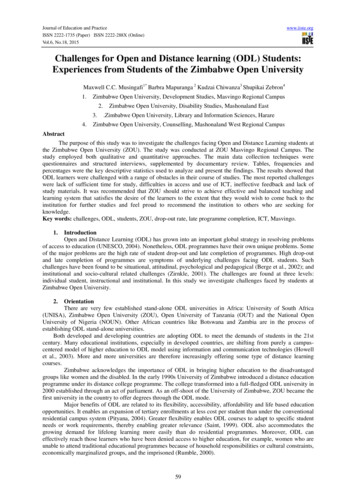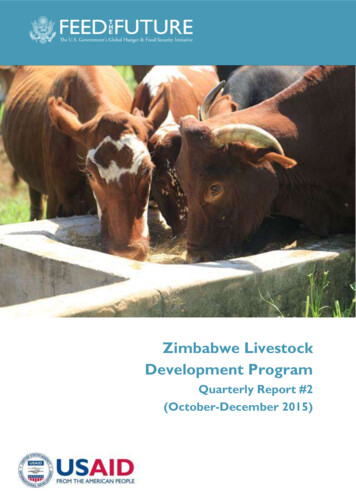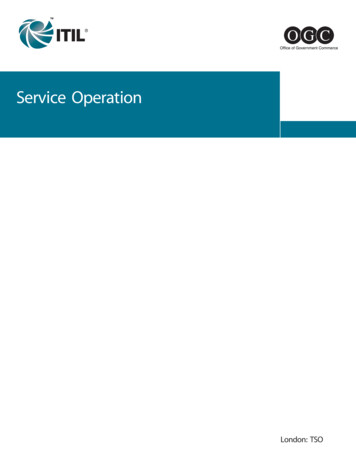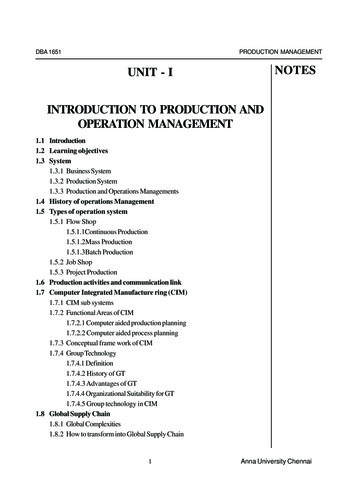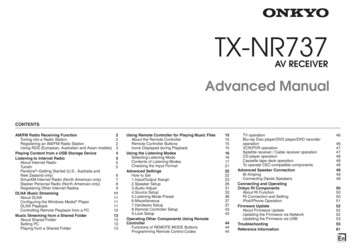
Transcription
ZIMBABWE'S OPERATION MURAMBATSVINA:THE TIPPING POINT?Africa Report N 97 -- 17 August 2005
TABLE OF CONTENTSEXECUTIVE SUMMARY AND RECOMMENDATIONS. iI.INTRODUCTION: OPERATION MURAMBATSVINA. 1A.B.C.II.WHAT HAPPENED .1WHY IT HAPPENED .31.The official rationale.32.Other explanations .4WHO WAS RESPONSIBLE?.5INTERNAL RESPONSE . 7A.B.C.D.E.THE GOVERNMENT: OPERATION GARIKAI .7ZANU-PF .8THE MDC.9A THIRD WAY?.11CIVIL SOCIETY .12III. THE REGIONAL RESPONSE . 13A.B.SOUTH AFRICA AND SADC .13THE AFRICAN UNION .14IV. THE WIDER INTERNATIONAL RESPONSE. 15A.B.C.THE UNITED NATIONS .15THE WEST .17THE EAST: CHINA'S ROLE .18V. CONCLUSION: A TIME TO ACT . 19APPENDICESA. MAP OF ZIMBABWE.22
Africa Report N 9717 August 2005ZIMBABWE'S OPERATION MURAMBATSVINA: THE TIPPING POINT?EXECUTIVE SUMMARY AND RECOMMENDATIONSOperation Murambatsvina (Restore Order) cost some700,000 Zimbabweans their homes or livelihoods orboth and otherwise affected nearly a fifth of the troubledcountry's population. Its impact, as documented in ascathing UN report, has produced a political shock thathas returned Zimbabwe to the international spotlight andmade the quality of its governance almost impossiblefor its regional neighbours to ignore, however difficultthey find it to be overtly critical. While an immediaterequirement is to reverse as thoroughly as possible thedisastrous humanitarian effects of the operation, action isurgently needed to address Zimbabwe's larger governanceproblem. This will require efforts on three parallel tracks -the maintenance of overt international pressure, supportfor building internal political capacity and, above all,active regional diplomacy to facilitate political transition.Kofi Annan's initiative to send Anna Tibaijuka, theTanzanian director of UN Habitat, as his Special Envoyto report on the two-month military style campaign, hasexplicitly confronted the international community, inAfrica and beyond, with its responsibility to help protectthe people of Zimbabwe. Her findings show that theZimbabwe government collectively mounted a brutal, illmanaged campaign against its own citizens. Whatever itsintent -- the urban clean-up claimed by authorities, ormore sinister efforts to punish and break up the politicalopposition lest resentment explode into revolution -- thatcampaign has exacerbated a desperate situation in acountry already sliding downhill for a half-decade.That much is clear, as is Zimbabwe's need for outsideengagement, both for the sake of its own people andbecause the implosion that Murambatsvina hasbrought dramatically nearer would shatter the stabilityof southern Africa. The government lacks theresources, and has yet to prove it has the genuine will,to repair the immediate humanitarian damage. Whilethis is not the time to be offering it any concessions,and certainly no development aid should flow untilthere is significant political and economic reform,traditional humanitarian relief principles require thatdonors offer assistance to those needing it. But theyshould take care that any such assistance is notdiverted to serve ZANU-PF's political purposes.Zimbabwe's own political forces are increasinglystalemated. The ZANU-PF party, already discreditedin the eyes of many inside and outside the country forwhat the UN report starkly described as a decline in therule of law as well as egregious economic mismanagementand human rights abuse, is deep into a fight for successionto Robert Mugabe, and playing an internal blame gameon Murambatsvina as part of that internecine struggle.The opposition Movement for Democratic Change(MDC) is preoccupied with leadership controversies ofits own and existential strategy debates in the wake ofdefeat in March in yet another rigged election. Inabilityto influence Murambatsvina has cost it much confidencein itself and among its supporters, and the party badlyneeds to refocus and reform. Some important backers inZimbabwe's business community are showing interest inexploring a new "third force" party, but there is little signof that gathering momentum.Non-Africans, whether the U.S., the European Union andits Member States, or members of the Commonwealth,lack leverage to do much about this immediate situation.They can and should maintain international pressure forchange by the mostly symbolic means at their disposal,including tougher targeted sanctions against key ZANUPF figures, and rigorous monitoring of human rightsabuses with a view to pursuing remedial measures in theappropriate international forums: such efforts forcethe ZANU-PF government to pay at least some costfor misdeeds and help keep Africa committed to genuineresolution of the problem. They should also seek ways, inconsultation with local and regional players, to buildup the long-term political capacities of Zimbabweancivil society.But the heavy lifting -- if it is to be done -- must comefrom African states and institutions. They should receiveunderstanding and support from the wider internationalcommunity to conduct regional diplomacy in their ownpreferred quiet way -- provided that diplomacy is realand not just an excuse for allowing a dangerous situationto drift. Pretoria and other key African capitals shouldwork, preferably under African Union auspices, to puttogether a team of distinguished former presidents to
Zimbabwe's Operation Murambatsvina: The Tipping Point?Crisis Group Africa Report N 97, 17 August 2005mediate a genuine and generous compromise that couldstart Zimbabwe toward new governance and new elections.Page ii6.Zimbabwe civil society should seek the unity andregeneration of the pro-democracy movement,including by supporting elections for the leadershipof the opposition at the earliest possible time.RECOMMENDATIONSTo pursue constructive change through regionaldiplomacy:To maintain international pressure forconstructive change:7.1.2.3.4.South Africa should work with Nigeria and otherAfrican states, if possible through the AfricanUnion's Peace and Security Council and with thesupport of other African institutions, to establish amission of distinguished former African presidentsto explore with President Mugabe, ZANU-PF, theMDC and other political forces in Zimbabwe apolitical transition strategy, which might involvea dignified option for withdrawal of PresidentMugabe from an active political role, creation ofa credible government of national unity, a periodfor new or revised political groupings to formand, ultimately, properly internationally supervisedelections.The Zimbabwe government, ZANU-PF and theMovement for Democratic Change (MDC)should adopt open and constructive attitudes toefforts by South Africa, Nigeria, other Africanstates and African institutions to mediate anend to the national political stalemate.South Africa should also apply conditionalityconcerning at least economic reform to the creditline it proposes to extend to Zimbabwe andrequire a monitoring mechanism so it can assureitself that the conditions are being met and themoney is being used for the intended purposes.The United States, the European Union and itsMember States, the members of the UN SecurityCouncil, and the wider international communityshould support the efforts of South Africa, otherAfrican states and African institutions to conductmeaningful regional diplomacy with Zimbabwe,including efforts to pursue political mediation suchas that outlined in recommendation 1 above.The United States, the European Union and itsMember States, the members of the UN SecurityCouncil, and the wider international communityshould:(a)expand targeted sanctions such as visarefusals and asset freezes against seniorgovernment and ruling party figures andimplement them more rigorously untilthere is meaningful progress on humanrights and political reform;(b)encourage independent expert investigations,including by special rapporteurs, ofallegations of serious human rights abuse,such as misuse of food aid for politicalpurposes and torture of detained politicalopponents, with a view to pursuing remedialmeasures in the appropriate internationalforums; and(c)give no developmental assistance untilthere has been some meaningful progresstoward political and economic reform,and then only upon the condition thatspecific further benchmarks are met.To reverse the immediate humanitarian impactof Operation Murambatsvina:8.The Zimbabwe government should takecomprehensive action to implement in full therecommendations of the report of the UNSecretary General's Special Envoy (the TibaijukaReport), including:(a)compensating those whose property wasunlawfully destroyed, creating anenvironment for effective relief,reconstruction and resettlement, andensuring unhindered access of humanitarianworkers and delivery of aid to victims ofthe operation;(b)holding to account those responsible forplanning and executing the operation,including through prosecution where lawswere broken; and(c)respecting its international obligations toprotect the rights of refugees and grantingTo build political capacity:5.South Africa and other African states, Africaninstitutions, the United States, the European Unionand its Member States, and other interestedmembers of the international community shouldengage in stepped up programs of assistance todemocratic forces with a view to developing overtime a stronger civil society, a more democraticpolity and a generally more effective political class.
Zimbabwe's Operation Murambatsvina: The Tipping Point?Crisis Group Africa Report N 97, 17 August 2005full citizenship to former migrant workersresiding for a long period in Zimbabweand their descendants.9.The African Union, Southern African DevelopmentCommunity (SADC) and Zimbabwe's regionalneighbours should make clear their expectationsthat Zimbabwe will implement fully therecommendations of the Tibaijuka Report.10.The African Union should encourage the AfricanCommission on Human and Peoples' Rights toinvestigate whether Operation Murambatsvinabreached Zimbabwe's obligations under theAfrican Charter on Human and Peoples' Rights.11.The World Bank should conduct a comprehensiveinvestigation of the economic consequences ofPage iiiOperation Murambatsvina with a view to assessingreconstruction, resettlement and recovery needs.12.The United States, the European Union and itsMember States, the members of the UN SecurityCouncil and the wider international communityshould insist that the Zimbabwe governmentimplement fully the Tibaijuka Reportrecommendations, place the matter on the agendaof the Security Council for periodic review, andoffer humanitarian assistance to the extentnecessary, provided such aid can be deliveredto the needy without unacceptable governmentinterference and adequate monitoring mechanismsare in place to prevent diversion.Pretoria/Brussels, 17 August 2005
Africa Report N 9717 August 2005ZIMBABWE'S OPERATION MURAMBATSVINA: THE TIPPING POINT?I.INTRODUCTION: OPERATIONMURAMBATSVINAOn 25 May 2005, the government of Zimbabwe launchedOperation Murambatsvina1, allegedly to "clean up" itscities. Executed with the combined force of the police, thearmy and youth militias, it started in the capital, Harare,but quickly was extended to practically all urban centres,including Bulawayo, Chinhoyi, Gweru, Kadoma, KweKwe, Marondera, and Mutare. While originally targetingvendors in Harare's central districts, it soon includeddemolition of illegal structures of informal traders, shantyhomes of the poor and unauthorised residential extensionsof more well-to-do residents of low density suburbs.Government sources indicated it was planned also tocover rural areas, especially formerly white-ownedcommercial farms.2 Bulldozers played a major role inflattening structures, but frightened residents were alsoforced to pull down their own property. Those who didnot do so fast enough or offered resistance were oftenbeaten by the police.31"Murambatsvina" is a Shona verbal noun which breaks downto "muramba" meaning "one who refuses" and "tsvina" whichmeans "dirt" or "filth". In this sense, Murambatsvina wouldmean "the one who refuses dirt". It is commonly used in aderogatory sense to refer to a person who is too particular abouthis appearance. Murambatsvina was coined by ZANU-PF as anexhortation to reject the dirt and chaos associated with slums,shacks, and informal markets and trading. Devised as a two-stepprocess -- the clean-up phase followed by a rehabilitative phase-- the operation has also been dubbed "Operation Tsunami",because of the violence and destruction it has produced. CrisisGroup interview with Action Aid official, Harare, 20 July 2005;Tafi Murinzi, "In the midst of restoring order -- chaos," Reuters,3 June 2005. We have accepted here the neutral translation"Restore Order" adopted by the UN Special Envoy in her report,cited below in footnote 4.2Minister of Local Government, Public Works and UrbanDevelopment Igantius Chombo said, "this exercise is a nationalexercise and will go to rural areas. We are not going to spareany pocket which is illegal". Crisis Group telephone interview,June 2005. However, Murambatsvina appears to have beenessentially concluded before reaching the formerly white-ownedcommercial farms. Chombo is often referred to as the HousingMinister, since that is part of his ministry's portfolio.3Crisis Group interviews with officials of the ZimbabweHuman Rights Forum, Harare, July 2005. See ZimbabweThe first hint came on 18 May, when Dr Gideon Gono,Governor of the Reserve Bank of Zimbabwe, in astatement on "Post Election and Drought MitigationMonetary Policy", called for reorientation of lawenforcement bodies to fight widespread corruption andindiscipline that he blamed for the country's economic andfinancial problems. The next day Sekesai Makwavarara,chairperson of the government-appointed Harare CityCommission, explained that the government planned asweeping operation to "enforce bylaws, to stop all formsof illegal activities in conjunction with ZimbabweRepublican Police (ZRP)". On 24 May, the City ofHarare called on owners to pull down unauthorisedresidential structures in the outer suburbs by 20 June 2005but the government operation began just one day later.A.WHAT HAPPENEDThe best and most thorough account of the devastationwrought by Murambatsvina has been produced by AnnaKajumulo Tibaijuka, the Tanzanian director of the UNCentre for Human Settlements (Habitat), whom UNSecretary General Kofi Annan appointed as his specialenvoy to investigate once news accounts began to makeclear that something extraordinary was happening.Following an intense two weeks of travel and meetingsin Zimbabwe, Tibaijuka published her detailed report on18 July 2005.4 Crisis Group's own extensive research,including inside Zimbabwe, has unearthed no basis fordisagreement with her findings that: as of 7 July, 92,460 housing structures had beendestroyed, affecting 133,5345 households6 atmore than 52 sites;Human Rights NGO Forum, "Order out of chaos, or chaos outof order? A preliminary report on Operation Murambatsvina",June 2005.4Mrs. Anna Kajumulo Tibaijuka, "Report of the Fact-FindingMission to Zimbabwe to Assess the Scope and Impact ofOperation Murambatsvina by the UN Special Envoy on HumanSettlements Issues in Zimbabwe", 18 July 2005, available The figures on housing structures and households are thosegiven by Minister Counsellor Pritchard Zhou of the ZimbabweHigh Commission in a public address at the Institute ofSecurity Studies, Pretoria, on 7 July 2005 and accepted by
Zimbabwe's Operation Murambatsvina: The Tipping Point?Crisis Group Africa Report N 97, 17 August 2005 " some 700,000 people in cities across thecountry have lost either their homes, their sourceof livelihood or both";7 an estimated 500,000 children were forced out ofschool or had their education seriously disrupted; at least six people, including four children, weredead as a result of demolitions and prolongedexposure to cold; and some 2.4 million persons -- 18 per cent ofZimbabwe's population have been directly orindirectly affected.8Vice President Joyce Mujuru announced on 27 July 2005that Murambatsvina had ended. This seems basicallyaccurate, at least with respect to large-scale actions,Tibaijuka. Some NGOs put the number of people displaced atbetween 750,000 and 1 million. Crisis Group interview withJonah Mudehwe, chairman of umbrella non-governmentalorganisations group, Harare, 6 July 2005. In any event, therewas some increase due to continuing demolitions for at least atime after the UN research was completed.6The average size of a household according to the 2002 census,accepted by Tibaijuka and used to produce her figure of700,000 rendered homeless is 4.2 persons; some organisations,however, consider that average to be conservative and usefigures between 5 and 5.8 persons, which would producea correspondingly higher estimate of the newly homeless. CrisisGroup interview with Jonah Mudehwe, chairman of a group ofZimbabwe NGOs, Harare, 6 July 2005.7Tibaijuka, op. cit., p. 7. This figure is an estimate but probablya conservative one. Tibaijuka (p. 33) explained: "While there isa degree of overlap between those who lost their homes andthose who lost their businesses, the total figure of 650,000 to700,000 people directly affected by the Operation is consideredplausible. This takes into account other reports of the number ofpeople arrested for alleged illegal or criminal activities (40,000),the substantial number of street vendors and hawkers who wereomnipresent in all cities and towns prior to the Operation, anddiscrepancies noted between the figures provided by the CentralGovernment, and those provided directly to the mission byResident Ministers (Governors) and Mayors in the course of onsite visits".8Tibaijuka explained (pp. 33-34) that the 2.4 million figureincludes in addition to those who lost homes or businesses,"those whose livelihoods are indirectly affected by, for example,loss of rental income and the disruption of highly integrated andcomplex networks involved in the supply chain of the informaleconomy. The upstream and downstream linkages include,for example, transport and distribution services, suppliers offoodstuffs from rural areas and, conversely, suppliers of inputsto rural areas, formal and informal micro-credit institutions, anda wide range of part-time and casual labour". The resulting totalestimates of the affected range between 2.1 million and 2.56million persons. Tibaijuka concluded that 2.4 million was anappropriate adjustment but added on 18 July, "This figure isstill increasing owing to ongoing evictions and destruction ofstructures "Page 2though it appears the police are still arresting as manyas 200 informal traders a day in remote areas,9 and on15 August 2005, Harare City Council spokesman LesleyGwindi told reporters that municipal authorities wouldshortly act to remove street children and illegal traderswho had returned to the capital and were again operatingfrom unapproved sites.10Following quickly upon the flawed 31 March 2005parliamentary elections,11 the operation has intensifiedthe country's political polarisation and five-year humanrights, governance and economic crisis. Referring to thecountry's devastating record of negative growth, a WorldBank official remarked, it is hard to "think of a countrythat has experienced such a decline in peace time".12Although Zimbabwe suffers from recurring drought andthe AIDS pandemic, its problems, as Crisis Group hasfrequently detailed, are primarily man-made, a mixtureof failed governance, food insecurity and manipulationof food for political ends, and economic meltdown,including triple digit inflation, over 70 per centunemployment, and large shortages of consumer items,fuel and foreign currency.13 Murambatsvina has intensifiedmany of these factors, especially the number of people inneed of humanitarian assistance, since orphans, widows,women, the chronically ill, elderly and disabled personsand households headed by children bore its brunt. Forexample, the operation seriously disrupted services tomany of the 24.6 per cent of the adult population that isinfected by the HIV virus and the country's 1.2 millionorphans -- both categories with limited mobility to copewith evictions.149"Clean-up over: Mujuru", The Herald News, 28 July 2005;"Zimbabwe police arresting 200 daily", Mail & Guardian, 8August 2005.10MacDonald Dzirutwe, "Zimbabwe says to resume cleanup blitz in capital", Reuters, 16 August 2005.11See Crisis Group Africa Report N 93, Post-ElectionZimbabwe: What Next?, 7 June 2005.12Lesley Wroughton, "Zimbabwe slump deepest for nonwar nation," Reuters, 26 July 2005.13See, for example, Crisis Group Africa Reports N 85, Bloodand Soil: Land, Politics, and Conflict Prevention in Zimbabweand South Africa, 17 September 2004; N 78, Zimbabwe: InSearch of a New Strategy, 19 April 2004; N 60, Zimbabwe:Danger and Opportunity, 10 March 2003; N 52, Zimbabwe:The Politics of National Liberation and International Division,17 October 2002; N 47, Zimbabwe: What Next?, 14 June 2002;and N 41, Zimbabwe at the Crossroads: Transition orConflict?, 22 March 2002.14Crisis Group interview with UN official, Pretoria, July 2005.The Zimbabwe Association of Doctors for Human Rights notedthat the evictions disrupted HIV/AIDS treatment programs andleft the sick exposed to the elements, resulting in increased
Zimbabwe's Operation Murambatsvina: The Tipping Point?Crisis Group Africa Report N 97, 17 August 2005Murambatsvina has also generated a new problem -large numbers of internally displaced persons (IDPs) -since lack of adequate infrastructure or a sufficientsupport plan, including relocation sites and services, hasleft many thousands without proper protection. Nearly 20per cent (114,000) of those displaced by the operationslept in the open at the mercy of winter temperaturesas low as 8 C at night, risking sickness or even deaththrough exposure.15 Another 20 per cent returned torural areas while nearly 30 per cent (170,000) shelteredwith family and friends in urban areas. The remaining30 per cent took temporary refuge in churches across thecountry or are moving around cities, sleeping mainly inparks, on the roadside, or in other open places.16 Policehave been rounding up this latter category, either detainingthem or sending them to unspecified destinations.17Thousands of those whose homes the governmentcondemned and demolished as uninhabitable are nowliving in tents and shacks without proper sanitation in"transit centres" hastily fabricated by the government,such as Caledonia Farm near Harare, which holds about5,000.18 The status of such centres is still unclear,complicating planning by humanitarian organisationsthat wish to offer assistance.19Some 80 per cent of Zimbabwe's 10,000 registeredrefugees and asylum seekers from other African countrieshave been living in urban areas despite a governmentpolicy that sought to restrict them to camps.Murambatsvina has exposed these "free livers" to arrestand eviction. Job Sikhala, a member from the oppositionMovement for Democratic Change (MDC) toldparliament that in his constituency (St. Mary's) 95 percent of the refugees from such countries as Malawi andZambia had been displaced.20 Nearly half of the 1,500families evicted from Porta Farm were from Malawi andMozambique but have come to consider Zimbabwe theirhome. In July, most were re-located to the CaledoniaPage 3Transit Camp, where their future is uncertain. Harareauthorities are insisting that the UN High Commissionerfor Refugees (UNHCR) relocate refugees to theTongogara refugee camp but its capacity (4,000) wouldbe seriously overstretched by the likely numbers.21 Thedispute over what to do about the refugees is symptomaticof much else in Murambatsvina, namely the almost totallack of planning and allocation of resources for dealingwith the consequences of massive and rapiddisplacement.22B.WHY IT HAPPENED1.The official rationaleThe government has insisted that Murambatsvina had nopolitical motivations and was justified as a long overdue"clean-up to remove the dirt that was becoming a nuisancein the cities".23 The authorities referred frequently toa need to "reassert the rule of law" and halt the chaosresulting from rapid urbanisation in the 1980s and 1990s.24The urban poor and informal traders were blamed fordeteriorating standards of health, housing and otherservices, the spiralling crime rate, hoarding anddisappearance of basic commodities from shops, and aswelling black market including for foreign currency, allof which the government argued, cost it considerablerevenue and undermined the country's economicturnaround.25Murambatsvina has also been described as a strategyto reverse environmental degradation resulting frominappropriate efforts at food growing by the poor in highdensity suburbs. The government has accused its criticsof mounting propaganda against "a simple clean-upoperation and a crackdown on crime", arguing that incountries as diverse as Kenya, Nigeria, South Africa and21deaths. "Police smash more homes in Harare", Mail andGuardian, 5 July 2005.15Crisis Group observation in Harare, Bulawayo and othertowns in June-July 2005; see also "Burning down the houseto kill a rat! An analysis of the demolitions in Zimbabwe",ActionAid International, July 2005, available at juka, op. cit., p. 35.17"Cleanup victims arrested for speaking to UN Envoy", SWRadio Africa, 29 July 2005.18Crisis Group interviews, Caledonia Transit Camp, Harare3 July 2005.19Crisis Group interview with a humanitarian worker inCaledonia Transit Camp, Harare, 30 June 2005.20Hon. Job Sikhala, "Oral answer to questions without notice",Parliament, 22 June 2005; Crisis Group was present during thesession.Crisis Group interview with government and UN officials,Pretoria, July 2005.22See also the discussion of the government's OperationGarikai, Section II A below.23Briefing by Minister Counsellor P. Zhou of the ZimbabweHigh Commission, Pretoria, 7 July 2005; see also GeorgeCharamba, Zimbabwe's Secretary of Information, "Zimbabwe:Operation Restore Order", New Africa, no. 442, July 2005, pp.36-39.24Speaking to UN Secretary-General Kofi Annan, Mugabereportedly expressed surprise that such a "mundane" operationwould be the subject of a UN investigation. Zimbabwe'sneighbours in southern Africa were equally upset that the UNfound it necessary to send the envoy to write a report. CrisisGroup interview with a senior government official, Harare,July 2005.25Briefing by Minister Counsellor P. Zhou of the ZimbabweHigh Commission, op. cit.
Zimbabwe's Operation Murambatsvina: The Tipping Point?Crisis Group Africa Report N 97, 17 August 2005Mexico, slum clearance and severe handling of illegaltraders is routine.26 Furthermore, the government argued,it acted legally, pursuant to laws long on the books.272.Other explanationsOther less benign motivations have been suggested,and with Murambatsvina having occurred against thebackdrop of five years of government-sponsored politicalviolence, they are rather more persuasive. Althoughthe 31 March 2005 elections occurred in a relativelycalm and violence-free environment and produced thetwo-thirds parliamentary majority which the governmentsought so it could amend the constitution at will, theyleft a sizeable opposition and a large, unhappy populationin place, particularly in the cities. The MDC took 26of 30 parliamentary seats in major towns and cities.28It also controls local government in the country's sixlargest cities, with the exception of Harare, where thegovernment disbanded the local council in 2004 inorder to replace it with a ZANU-PF commission.29There are indications that the ruling ZANU-PF partysought to weaken the MDC further, punish many ofits supporters, and lance the boil of dissatisfaction inheavily populated urban centres before it could
Zimbabwe's Operation Murambatsvina: The Tipping Point? Crisis Group Africa Report N 97, 17 August 2005 Page ii mediate a genuine and generous compromise that could start Zimbabwe toward new governance and new elections. RECOMMENDATIONS To pursue constructive change through regional diplomacy: 1. South Africa should work with Nigeria and other



